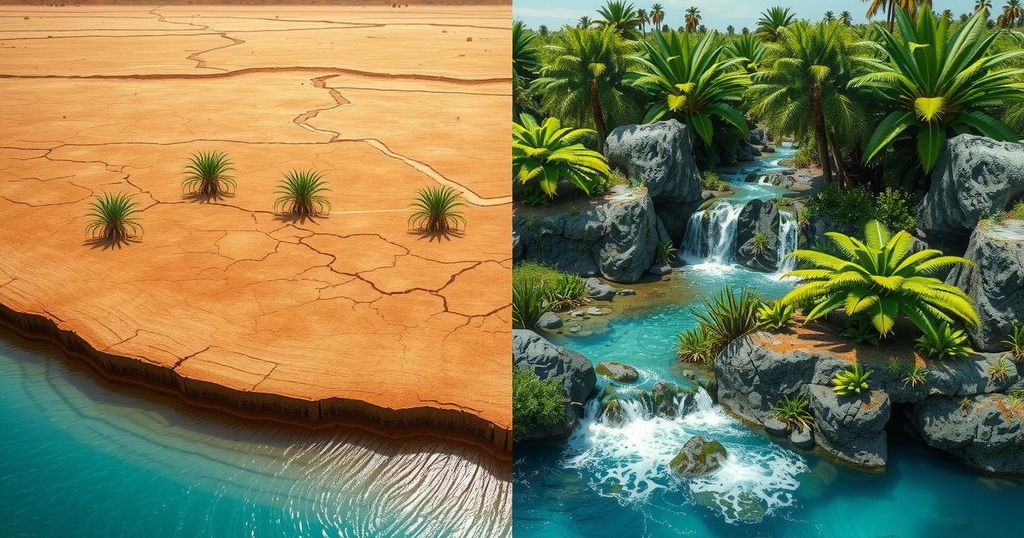A recent study in Nature illustrates how climate change is exacerbating global water inequality, leading to increased scarcity in regions like India while improving conditions in others such as Nigeria. The research highlights the need for tailored adaptation strategies and effective management practices to address water stress, particularly in vulnerable areas. Key projections suggest severe implications for populous and agricultural-dependent nations amidst changing climate scenarios.
Recent research published in the journal Nature highlights the uneven distribution of water resources globally, a disparity that climate change is expected to worsen. Countries with varying hydrological conditions will experience different levels of water scarcity, with nations such as India anticipated to face greater water shortages while areas like Nigeria and Sudan may benefit from altered precipitation patterns.
The widening water gaps are likely to exacerbate regional tensions, particularly in areas with existing political sensitivities. A report by the United Nations Convention to Combat Desertification (UNCCD) underlines how increased resource pressure could lead to conflicts, emphasizing the importance of tailored policies for each region.
Planning for these challenges is hindered by the lack of precise data. Approximately 93-95 percent of employment in Nature-Based Solutions aimed at enhancing water security and combating land degradation occurs in the Asia-Pacific region, largely through programs in India like the Mahatma Gandhi National Rural Employment Guarantee Scheme (MGNREGS). However, despite these efforts, issues of water scarcity persist in various Indian cities, revealing gaps in water management.
The study co-authored by Lorenzo Rosa and Matteo Sangiorgio stresses the crucial need for comprehensive quantification of water resources and the development of predictive models to effectively plan for future scenarios. There exists a significant demand for informed decision-making to address the challenges posed by water scarcity, highlighting the necessity of integrating data on groundwater and environmental flows.
The research presents a multi-model approach to evaluate water gaps, quantifying deficits in cubic kilometers at the level of major hydrological basins. It employs simulations across multiple climate models from the Coupled Model Intercomparison Project (CMIP6) to analyze past and future conditions, accommodating the needs of all ecosystems.
Findings indicate that regions including California’s Central Valley, Central Chile, and the Indo-Gangetic Plains will see increased water gaps under global warming conditions, particularly worsening at a 3°C increase in temperature. Certain regions previously unaffected under baseline scenarios may face declining conditions as temperatures rise.
The study reveals India faces substantial water challenges compared to other countries, especially given its extensive agricultural water use. Projections indicate a 11.1 cubic kilometer water deficit per year for India at a 1.5°C warming scenario, significantly higher than that of China, which is at 4.1 cubic kilometers per year.
South Asia, encompassing India, Pakistan, and Bangladesh, is identified as the most severely affected region. The study advocates for the expansion of successful water management programs and sustainable agricultural practices to enhance resilience against climate change, prevent migration, and secure water supplies.
Countries such as the Philippines and Vietnam are expected to see improved water availability; however, they must prepare for potential flooding events. The research also notes increasing water stress in the Middle East and North Africa, prompting a need for strategies similar to those proposed for South Asia to mitigate impending crises.
In light of the study’s findings, it is crucial for nations to adopt sustainable resource management practices and address potential contamination of water sources. Future research should strive for improved rainfall pattern predictions and more sophisticated monitoring methods to validate model outcomes.
In summary, climate change is amplifying the disparities in global water resources, leading to significant challenges for countries like India, while certain regions may experience improved conditions. The current research underscores the necessity for data-driven strategies tailored to specific regional needs. The ongoing efforts to enhance water security in affected regions particularly through sustainable practices are vital. Continued research is essential to better understand the evolving water landscape and inform effective policy implementation.
Original Source: www.downtoearth.org.in




